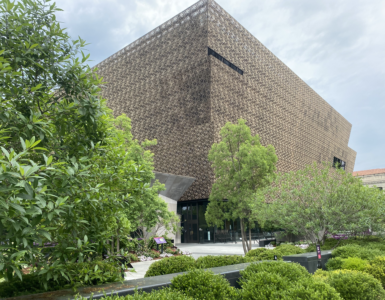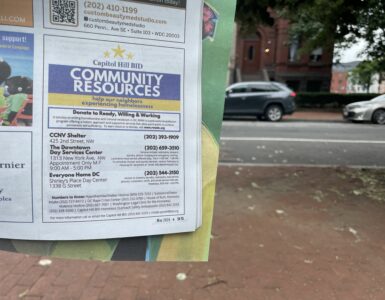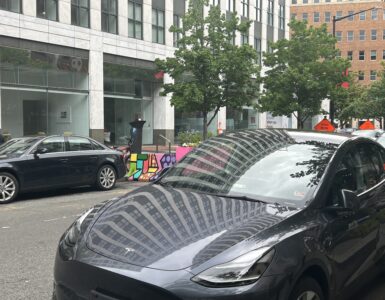When Desire Lemoupa stepped out of the airport for the first time in the United States, he first felt the cold. His winter jacket was no match for the biting Kansas wind in January. The second thing he felt was relief. After a grueling flight from Cameroon via Brussels, he had finally reached safety.
Lemoupa, now 34 and living in Capitol Heights, was a medical lab technician in his home city of Bamenda in northwestern Cameroon when he left in 2015. But as a gay man in a country where homosexuality carries a potential five-year prison sentence and torture and violence are a constant threat—a hardship Lemoupa had experienced firsthand—he felt he had to leave.
“I could really see the light at the end of the tunnel,” Lemoupa said of arriving in the U.S. “I felt like, yes, I am in a land that supports people’s rights and that stands up for people like me.”
Lemoupa’s optimism has since faded, ground down by an asylum process that left him in legal purgatory. For eight years, his asylum application has languished in the U.S. Citizenship and Immigration Services (USCIS) backlog, leaving him struggling to advance his career, build a life, see friends and family, and even, at times, legally drive a car.
“This place hasn’t been feeling like a safe haven for a while,” Lemoupa said.
Lemoupa entered the U.S. on an international student visa with restrictions. After he arrived in Washington, D.C., following a brief stint in California, he filed an “affirmative” asylum application, available only to asylum seekers who entered the country legally; not via an unauthorized border crossing.
“I was supposed to have had an interview in 21 days, according to the message that was on the USCIS website at the time,” Lemoupa recalls. However, almost three months later, he received a letter from USCIS that only confirmed receipt of his application. “I was a little frustrated at the time, but I mean, there was nothing I could do.”
Lemoupa is not alone. The size of the backlog for affirmative asylum cases has ballooned in 2023. As of August, 974,571 affirmative asylum applications were pending a final decision, USCIS reported, up from around 238,000 in 2022. Processing times can take over a decade and are set to grow as the backlog could reach one million applications by the end of 2024, a Department of Homeland Security ombudsman report said in June.
A $40 million proposal in the Senate to reduce the backlog is on the line in the fiscal tug-of-war over 2024 appropriations in Congress.
Part of the backlog can be attributed to a surge in affirmative asylum filings. In 2022, the agency received more than 230,000 applications—a record high. As of Sept. 15, the agency had received some 430,000 in 2023. There are also fewer staff to handle the influx of applications. The agency has 760 working officers, 72 fewer than in December 2022.
While affirmative asylum seekers are eligible for work permits 180 days after filing their application, many report facing additional career hurdles because of their pending status.
“Nobody will really want to give you any position of authority or responsibility because they will feel like you don't have a status, and they don't really see you like a long-term employee,” Lemoupa said.
Lemoupa has also had difficulties keeping a driving license, as licenses expire every one, two or five years with an asylum applicant’s work permit. In one instance he was unable to drive for a three-month period while he waited for his renewal, which endangered his job as a care worker in a group home for people with disabilities. He has also been unable to leave the country to see friends or family abroad with a pending application.
Andrea Barron, an advocate for torture survivors, is working with more than 100 affirmative asylum applicants in the DMV area who have been waiting more than five years for an asylum interview to determine their application.
“None of our people—zero—have gotten interviewed in the past few years unless they got what’s called an expedited interview,” Barron said. “It’s so unfair.”

On a chilly Autumn evening around Capitol Hill she called and checked in with her clients. Barron, 72, program manager at Torture Abolition and Survivors Support Coalition (TASSC), speaks at a rapid clip, a Boston twang betraying her New England origins. “Hello? Are you okay? Your voice doesn’t sound so good.”
She extolls her work helping asylum seekers present their testimony to policymakers with the same passion as she does her go-to menu item at her favorite Thai eatery or the meeting she attended the previous evening with a group working to combat political polarization.
“The Biden administration said it would implement a more ‘humane’ and ‘fair’ asylum system,” Barron said. Human rights groups expected that asylum applicants waiting more than five years for an interview would finally receive an answer on their applications. “That turned out not to be true. The Biden Administration developed a better asylum system for some migrants,” Barron added.
For example, applications from Afghan citizens received during the U.S. withdrawal have received priority, as have more recent cases under a “Last In, First Out” policy.
Maryland's Sen. Chris Van Hollen (D), who sits on the Appropriations Committee and pushed for the $40 million recommendation in the FY2024 Department of Homeland Security appropriations, has championed the issue in Congress. Since 2021, groups of affirmative asylum applicants have written letters to his office, and the senator’s aides have met with Lemoupa and a handful of other applicants on Capitol Hill.
The DHS appropriations bill passed in the House does not include the $40 million earmarked for easing the backlog. There will likely be much wrangling over spending commitments in the political tussles before the February government funding deadline.
“We're trying to get these voices before the key people at this point,” said Steve Metalitz, a TASSC volunteer, “which is right now the House appropriators.”
Some organizations, however, argue taxpayer money should not be used to clear the backlog and that this money should be raised from charging asylum applicants filing fees, a proposal tabled by former President Trump but nixed under Biden.
“Applicants, not U.S. taxpayers, should pay their fees to adjudicate applications. That is a sound fiscal policy,” Lora Ries, director of the Border Security and Immigration Center at the Heritage Foundation, told The Wash through a spokesperson. “Applicants for other benefit types cover the cost of asylum adjudications with higher fees of their own,” she added. “This administration needs to stop allowing aliens to apply for benefits for free.”
But even if the advocates win the funding fight, the $40 million alone won’t be enough to clear the backlog. Andrea and her team are also pushing for an end to Last In, First Out and for those waiting more than five years for a decision to receive priority for asylum interviews. This cause received support from progressive lawmakers in a letter to DHS Secretary Alejandro Mayorkas in September 2021.
Today I sent a letter with 40 House colleagues to @SecMayorkas and @USCISDirector asking them to address the backlog of 400k asylum cases at @DHSgov. No one who has escaped persecution, or even torture, should have to wait 5 to 7 years for a decision. pic.twitter.com/qPBrsqutB2
— David Cicilline (@davidcicilline) September 10, 2021
Lemoupa thinks he must have met with congressional aides three or four times a year, every year, since 2021.
“Going into all these congressional meetings, one thing I will tell you is when you go there, they pay attention. They listen to you; they take notes; they're empathetic. That part of it is good. But on the other hand, they keep telling you, ‘oh, we are very limited in what we can do,’” Lemoupa said.
“I think the policy wheel might be too slow to turn,” he added.
The optimism and relief that Lemoupa felt on that day in the Kansas winter has been replaced with anger.
“I feel enraged,” he said. “We're not asking for any special treatment. I'm not asking that I should be given a status without due process,” Lemoupa added, “I'm asking for fair and equal treatment, which is not what we're getting from the system.”
“If it does not go in that appropriation, I will be even more enraged.”















[…] Read More […]